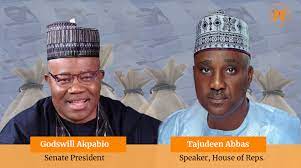By Abdul Lauya
At the invitation of the National Assembly of Angola, Inter-Parliamentary Union (IPU) statutory bodies, including the Governing Council, Standing Committees, Committees on Human Rights of Parliamentarians and on Middle East Questions, as well as the Forum of Women Parliamentarians and Young MPs, will converge on Luanda, Angola for its 147th session, from today, Monday, 23 through Friday, 27 October 2023.
As one of the formidable member parliaments, Nigeria’s delegation at the event, comprising women and young parliamentarians is led by the Senate President, Godswill Akpabio and the Speaker of the House of Representatives, Tajudeen Abbas.
The theme: “Parliamentary Action for Peace, Justice and strong Institutions (SDG 16)”, provides opportunity for peer review and exchange of experiences on the way forward for a peaceful world with strong institutions that guarantees justice for all. The Assembly will adopt resolutions on one of the emergency subjects of Democracy and Human Rights, titled: “Orphanage Trafficking: The Role of Parliaments in reducing Harm”.
IPU remains a significant organization in the realm of international parliamentary diplomacy, advocating for peace, democracy, and human rights. Its core objectives include: Fostering and promoting dialogue and understanding among parliamentarians to resolve international issues and conflicts through peaceful means; as well as supporting and advancing democratic principles and practices worldwide, helping parliaments to become more effective and transparent. Other objectives include promoting and protecting human rights and the rule of law, advocating for the rights of parliamentarians and the promotion of human rights globally among others.
As a vital platform for parliamentary activity, the IPU Assembly provides an invaluable opportunity to foster collaboration and shape global health policies. At this year’s Assembly, World Health Organization (WHO) will be addressing the General Assembly focusing on two key priorities that hold great significance for the future of global health. One of the topics for discussion during one of its workshop sessions at the 2023 Angola confab is “Unpacking the Development of the Pandemic Accord”.
Participants are expected to discuss ways of strengthening global health architecture, with focus on the work of the Intergovernmental Negotiating Body (INB). The workshop aims to explain the role of parliamentarians in the development of the Pandemic Accord, stimulate dialogue among parliamentarians, enabling them to share perspectives, concerns, and ideas on this ongoing process.
Also for discussion is “WHO’s Upcoming Strategy and Financing”, which aims at engaging parliamentarians in the critical process of sustainable financing for WHO, making them integral partners in shaping the future of global health. In this side event, WHO will present an overview of its 14 General Programme of Work and the associated financing. Participants will have the opportunity to interact directly with WHO representatives and gain valuable insights into how investments in health can pave the way for a safer, more resilient, and inclusive world, as envisioned in the 2030 Agenda and the Sustainable Development Goals (SDGs).
Established in 1889 with headquarters in Geneva, Switzerland, IPU serves as a focal point for cooperation among national parliaments. It facilitates the development of international law and institutions, strengthening the foundations and enhancing the vision for peace and the common good, including the Permanent Court of Arbitration, the League of Nations, and the United Nations.The Nobel Prize for Peace was awarded eight times to leading personalities of the IPU in the organization’s early years (1901–27).
Over the last 144 years, IPU has recorded significant successes including peace and conflict resolution, advancing women’s participation; providing support and resources to parliaments, helping them strengthen their legislative and oversight functions, and has advocated for the protection of human rights and the release of imprisoned parliamentarians in different countries among others.
Some of the challenges bedeviling the body includes limited enforcement mechanisms, diverse membership and funding. As an international organization, the IPU lacks the authority to enforce its decisions, making it a toothless bulldog. Also, the challenge of managing diverse membership with differing political, cultural, and social contexts is quite herculean. And like many international organizations, the IPU relies on contributions from member parliaments, and securing adequate funding presents a big a challenge.
This year’s confab is expected to climax with the adoption of an outcome document on the overall theme of the event, as well as elect the 31st President of the body. As the political head, the President chairs all statutory meetings and represents the organization at major global events.
IPU has 179 member parliaments out of the 193 nations in the world – from large countries like China, India and Indonesia, to small states of Cabo Verde, San Marino and Palau.

